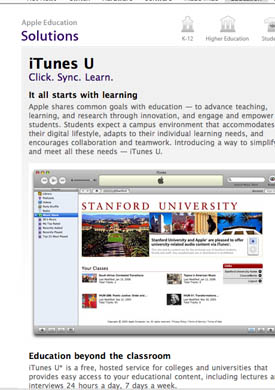During Bob’s synchronous chat with the Chronicle of Higher Education on Wednesday, I was reminded of the distinction he’s drawn between digital books that incorporate multimedia–text, audio, still and moving images–and those that are networked (and, as such, seem more dynamic and/or alive). Of course these two attributes are not mutually exclusive–and Bob never states/implies/screams that they are–but these two features, media-rich and networked, do seem to comprise the salient features of digital texts and the ways in which they part company with their paper counterparts. Moreover, the networked aspect of digital texts and all that it implies has NEVER escaped me–I wrote an hypertextual Master’s thesis complicating this very notion–still, I have bristled each time I’ve heard Bob’s proclamation that “it’s all about the network,” though I couldn’t seem to account for this reaction. Until, that is, I noticed other academics reacting similarly…
It hit me when the other day when Bob was asked a question by Michael Roy (one which reiterates a query from H. Stephen Straight) which said:
I was curious about your quote in the Chronicle article that suggests your change in focus away from multimedia texts towards networked texts. Can you elaborate on why you feel that the priority in development of new genres of electronic texts should be on their ‘networkedness’ rather than in the use of media?
Bob’s answer?:
it’s not really a move away from multimedia, just a re-orientation of its [sic] centrality in the born-digital movement. when i started working in this area full-time — twenty-six years ago — the public network that we know as the internet didn’t exist. our model at the time was the videodisc, an analog medium that suggested the book of the future would be just like the book of the past, i.e. a standalone, frozen, authoritative object. it took me a long time to realize that locating “books” inside the network would over time cause more profound shifts in our idea of what a book is than the simple addition of audio and video.
As I read this exchange it occurred to me why I/we have been harping on this issue and it has to do with our training. Poststructuralist theory taught us that there is no single book frozen in time; we have long since abandoned the notion of the authoritative tome. Foucault, for instance, posited the ‘author function,’ a position in a discourse community, one that contributed to the social construction of knowledge. Books, by extension, are always-already (given Jacque D’s recent passing, a little nod and an enactment of my point here), networked; they are part of a larger oeuvre and refer to each other extensively–thus they contain copious links, even if said links are a good deal more metaphoric in nature than the hyperlink of the networked text.
Moreover, reader response theorists such as Wolfgang Iser and Louise Rosenblatt taught us that the reader never approaches a text without bringing her own perspective to bear on it–a notion that renders each reading act as discrete–and each act of reading by the same reader is unique from the read that preceded it. In this world, then, the notion of a dynamic book versus one that is “frozen in time” becomes a non-issue. Indeed, in some respects, the networked book is in fact More traditional if it depends on textual language to conduct the interaction. Look at GAM3R 7H30RY–the method is unique but in terms of the knowledge made/gained etc, it is perhaps business as usual except for an accelerated and maybe more inclusive pace. By contrast, were you to put out a multimedia networked ‘book,’ and have it reviewed IN MEDIA-RICH language, that would be revolutionary.


